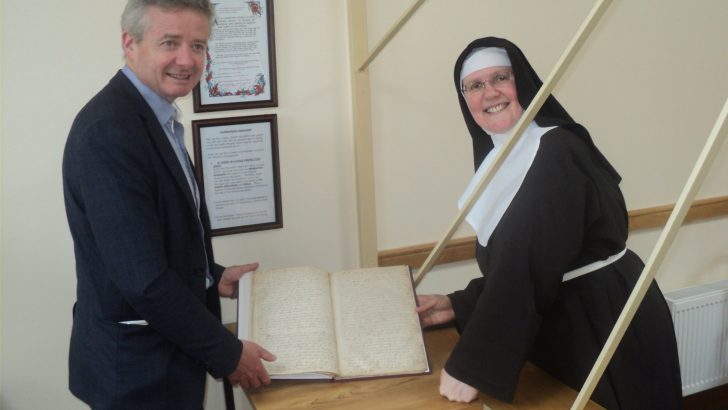“Church archives and the records of ecclesiastical bodies such as religious orders of priests, nuns and brothers are what stitches together the rent and ragged fabric of Irish history,” says UCD’s Prof. John McCafferty, beginning an enthralling podcast on the Royal Irish Academy website, ria.ie.
‘In time of inquistion: preserving and using the archives of the Irish Catholic Church’ is a particularly important episode in the academy’s current series of podcasts, ‘To Preserve and Protect: Contemporary Issues in Irish Cultural Heritage’, detailing as it does the threats posed to and the opportunities posed by Ireland’s Church archives.
“Their importance is accentuated by the hole burnt in the collective memory of the inhabitants of this island during the holocaust of the Four Courts site in 1922,” Prof. McCafferty continues. “They are for the most part uncharted, uncatalogued and highly vulnerable.
“At the same time they represent the best chance for Irish historians to break free from the intellectual and evidential bindings created by decades and decades of obsessive concentration on the past as merely past politics or as a vehicle for a poorly articulated heritage industry.”
Powerful
It’s a powerful opening, and one developed and supported in impressive fashion by the historian as he explains how all manner of fears and suspicions have conspired and continue to conspire to keep from public sight what many archives might tell us about our ancestors and ourselves, with time running out in terms of how we might engage with them now as their owners age and die out.
“Immense tasks lie ahead. These are tasks which everyone interested in Ireland’s past must take on. Otherwise there is a risk of imperilling or losing entirely the cultural patrimony of Ireland’s largest and most influential Church,” he says.
This requires real, honest, informed engagement, he stresses, one that gets beyond mental pictures of Ireland as a society dominated by the Church and that recognises Irish Catholics as simply one subset of a far larger global Church.
A failure to grasp this may not even be the worst failing of some historians, he suggests, observing that “most markedly there is a profound and – to be totally honest – vast disregard for the intellectual expressions and traditions of Christianity”.
Pointing out that just as to work in Parisian archives one should learn French, so one should know something of canon law and theology if one is to work in Church archives, he makes a damning observation.
“Here lurks what has been a corrosive self-infantilisation. So many historians of Ireland are cradle Catholics. They assume that because they attended Mass, whispered their childish confessions or served at the altar, that they actually know this Church and this religion,” he says.
“I can think of no other field of enquiry where the practitioners are happy to take 12-year-old understandings of the subject into the laboratory or library or – as in this instance – into the laboratory of history, the archive,” he adds, noting that his academic peers are by no means the sole offenders in this regard when it comes to modern Ireland.
“Such reflexively anti-intellectual inculturated views of Catholicism are not present among historians alone. They are just as easily detected among politicians and journalists – as well as clerics and even some theologians.”
Urging the owners of the archives to have the courage to open them to historians and urging historians to engage with the archives honestly and with informed and open minds, he says that “for once it’s time to set aside moralising discourse in favour of acknowledging the incalculable value of these materials for understanding of the Irish experience in the past and in the present”.
The podcast will take just over 20 minutes of your time. You’ll not find them wasted.


 Greg Daly
Greg Daly Professor John McCafferty, of the Department of History UCD
Professor John McCafferty, of the Department of History UCD 